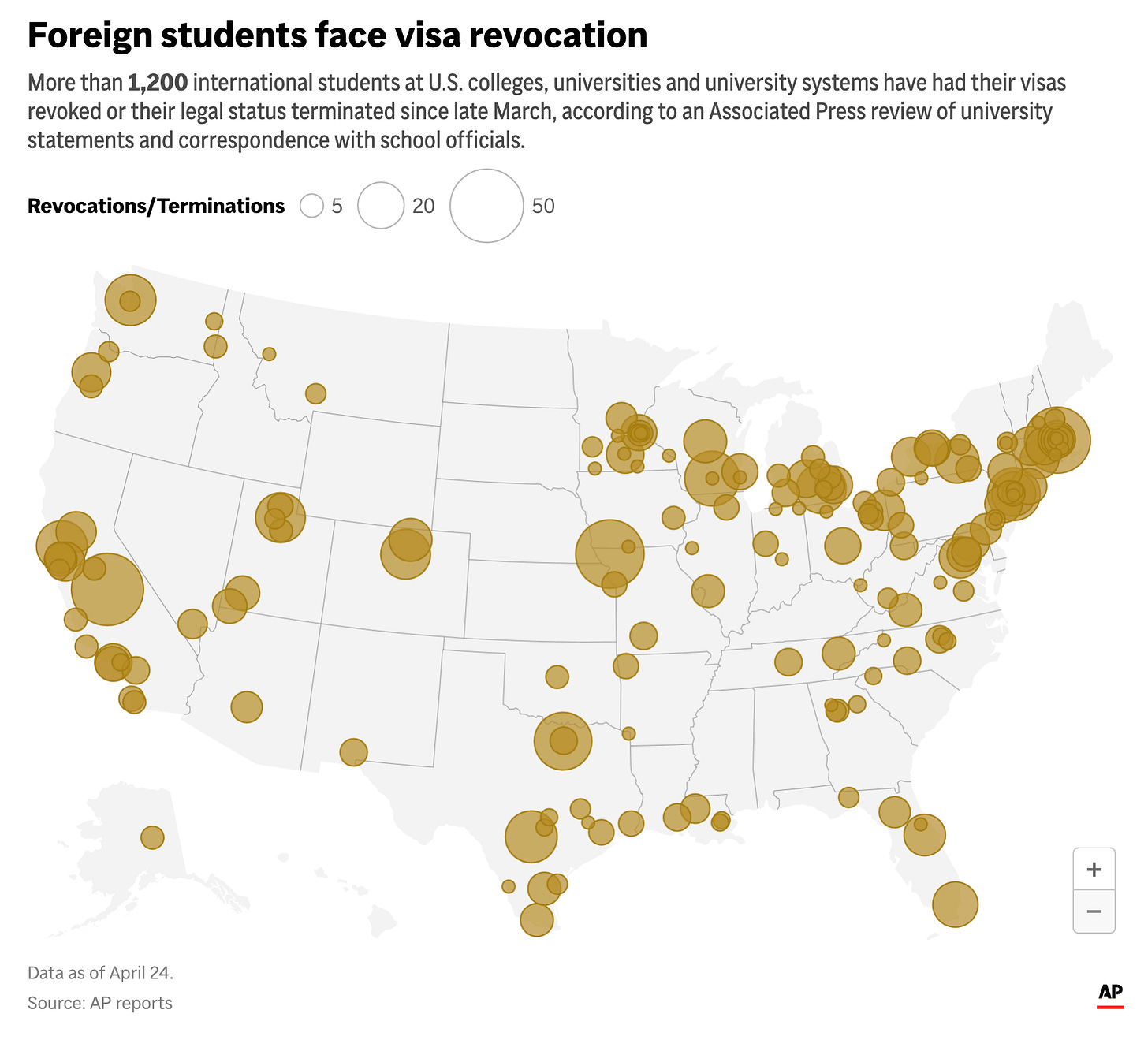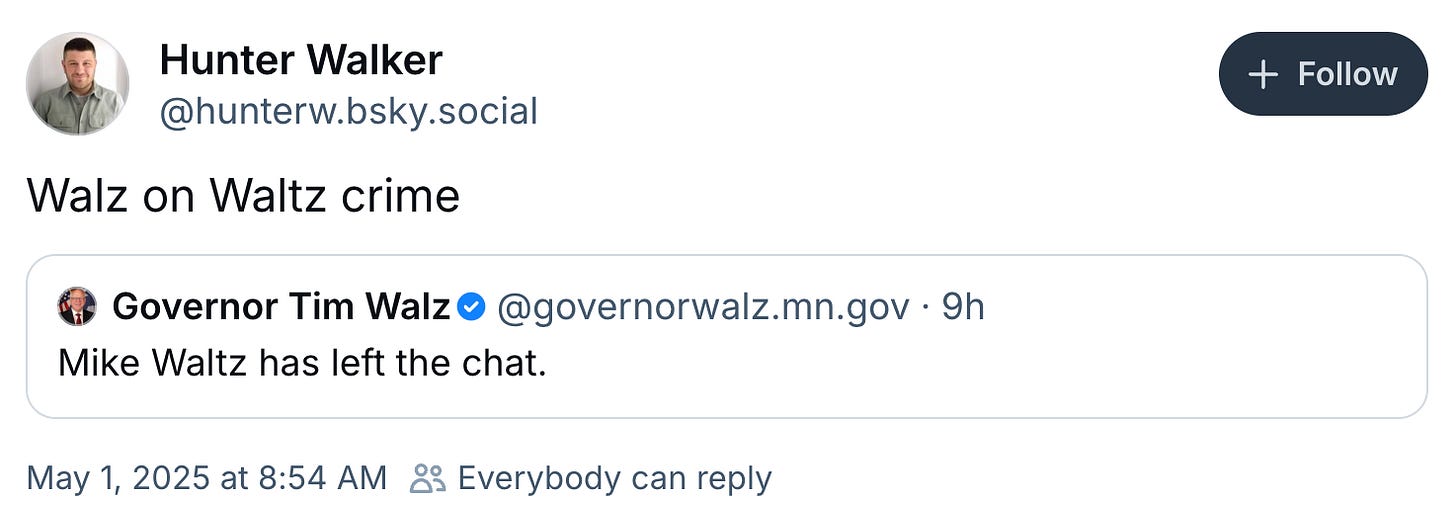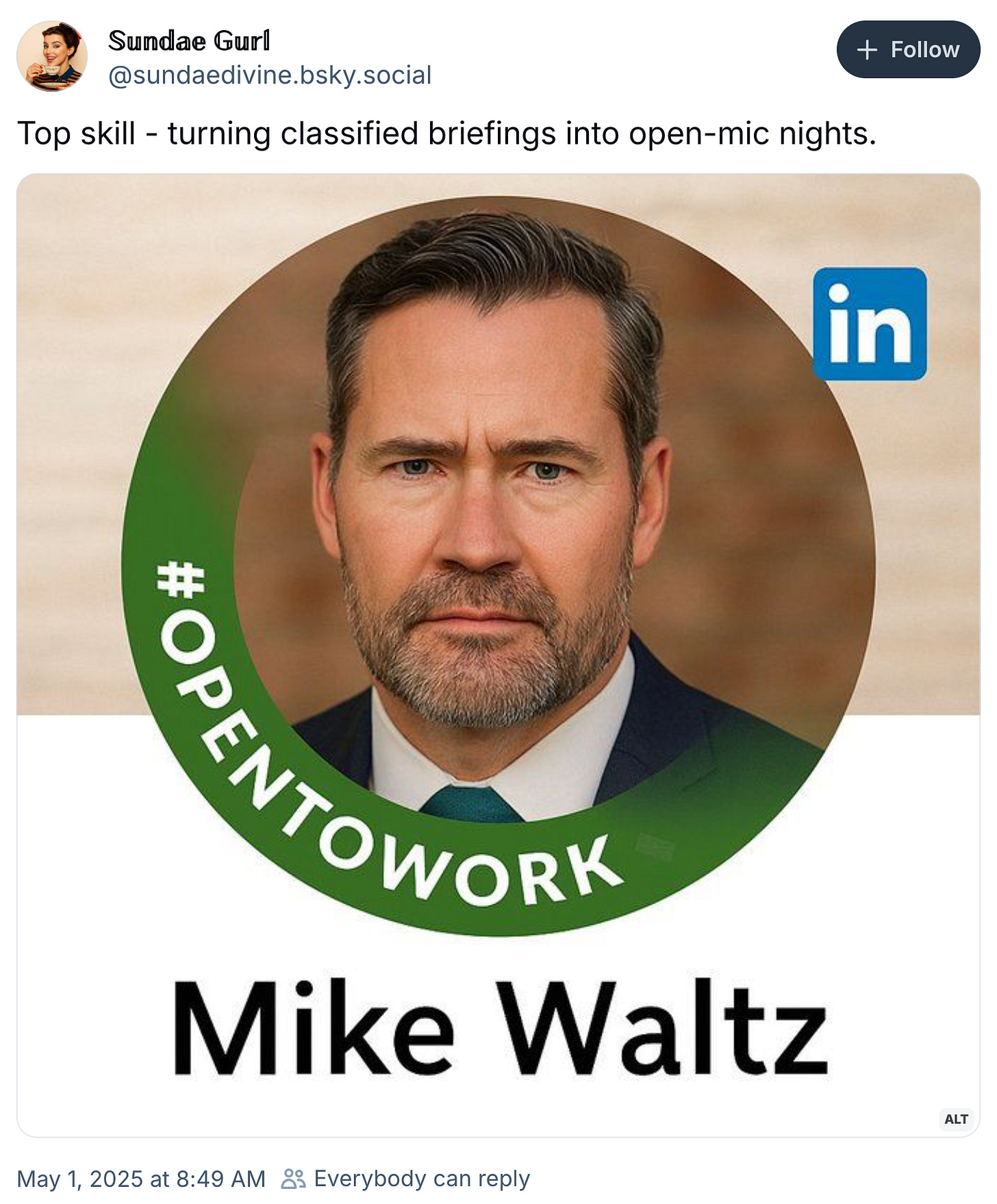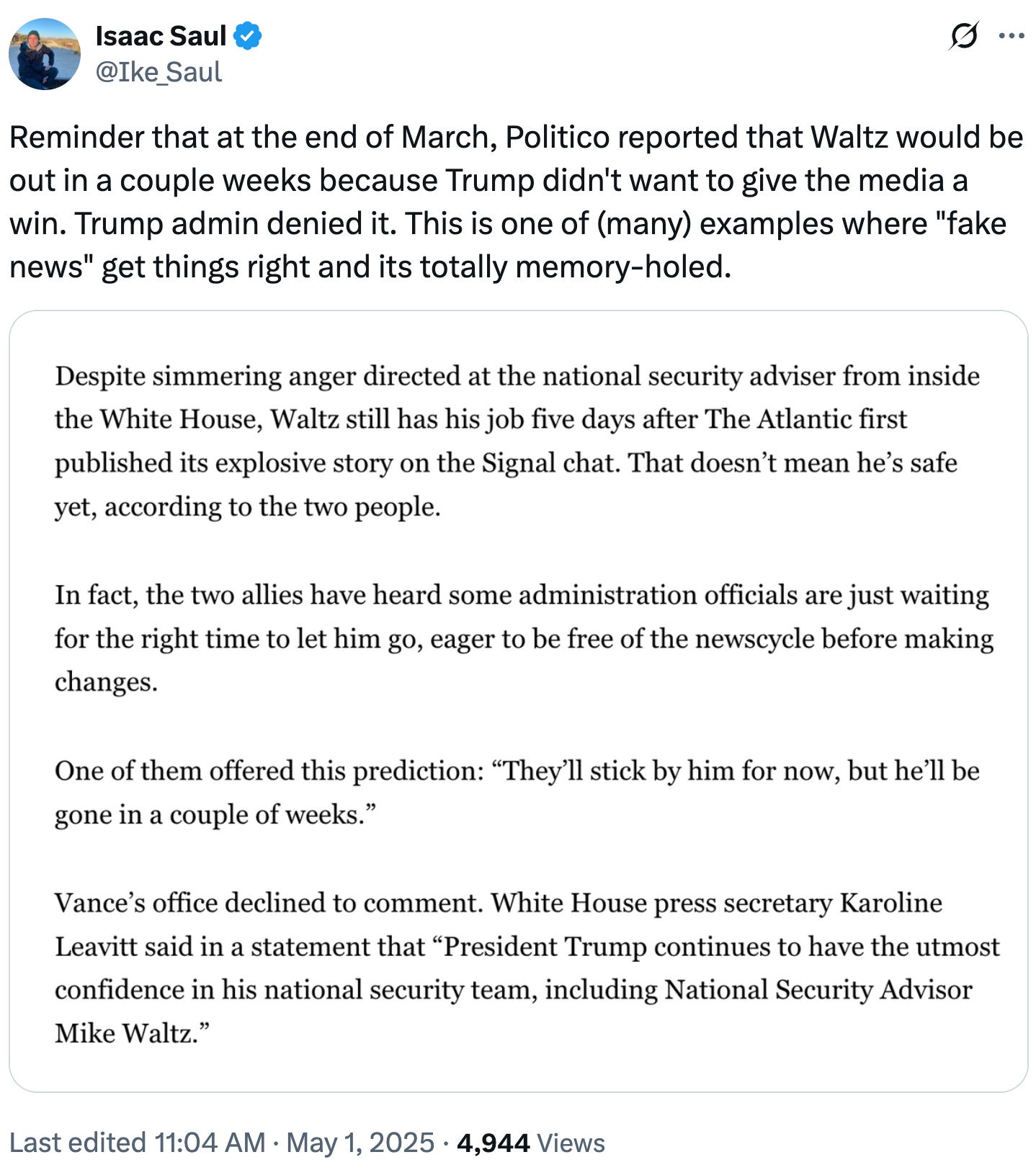
Doubling down
Why stop when you’re losing? … Sneak attacks, negotiations, a tug-of-war ... And firing people is so passé.
If 50 judges said your policy was on the wrong track, you might consider changing course.
But in true Trumpian fashion, federal officials are doubling down instead.
Over the past two months, the Trump administration revoked the visas of several thousand international students at over 200 universities, including more than 100 students at Arizona State University and the University of Arizona.
That led to a lot of stressed-out students, widespread public condemnation and dozens of irritated judges.
Last week, after judges across the country said federal officials violated the students’ rights to due process, it looked like the Trump administration might reverse course.
Federal officials announced they would reinstate at least some of the recently revoked visas. They also said they were developing a new “framework” and wouldn’t revoke any more visas until they issued a new policy.
That new policy came this week. And it’s even harsher than the old one.
Now, federal officials say there are even more reasons to justify stripping students of their legal status.
And having your visa revoked is now grounds for deportation. Previously, students would still be allowed to continue studying after their visa was revoked; they just wouldn’t be able to leave the country and come back in again.
As an immigration lawyer in Atlanta who’s representing 133 students put it:
“Basically, they’re trying to cover what they already did bad by making the bad thing that they did now legal for them to do.”
How the bad thing began
The wave of visa revocations was kickstarted when Secretary of State Marco Rubio decided to go after protesters on college campuses, calling them “lunatics.”
Then it got DOGE-level absurd.
In early March, pro-Palestinian protesters got under Rubio’s skin and he announced his department was going to use artificial intelligence to search for foreign nationals who appeared to support Hamas.
He called it a “catch and revoke” policy, a play on the “catch and release” policy at the U.S.-Mexico border.
“We don’t want people in our country that are going to be committing crimes and undermining our national security or the public safety,” Rubio said in March.
The search then ballooned from targeting protesters to include virtually all 1.3 million international students in the country.
The criticism the move stirred up rankled Rubio.
While sitting next to President Donald Trump, who was convicted of 34 felonies, at an April 10 Cabinet meeting, Rubio said student visas weren’t a “birthright” and criticized how the press was covering the visa revocations.
“If you come into my home and put all kinds of crap on my couch, I’m going to kick you out of my house,” Rubio said, leading to chuckles from the other Cabinet members.
As the public outcry grew, an unnamed senior State Department official whispered to the New York Post that the students were guilty of serious crimes, like “arson, assault and robbery.”
After stirring up similar vibes as Trump did in 2015 when he came down the escalator and called Mexicans rapists, another unnamed State Department official (or maybe the same one?) told Fox News they were taking a “surgical vetting approach” before revoking visas.
It wasn’t surgical
As federal lawyers tried to defend the policy in court, it came to light that a team of about 10 federal employees went into an FBI database and searched for students who had any kind of run-in with law enforcement.
Their search of 1.3 million names turned up 6,400 international students.
It quickly became clear that many of the students were not arsonists or robbers.
Instead, the violations often were little more than speeding tickets or misdemeanor violations, some of which didn’t result in formal arrests or were quickly dismissed.
One student had a fishing-related citation on his record that had been dismissed, but still made his name pop in the database.
Judges across the country ruled that the Trump administration violated students’ rights to due process, including a case in Southern Arizona.
Last week, a master’s student in Pima County said she was worried she would be separated from her U.S. citizen husband and their 2-year-old daughter, the Arizona Daily Star reported. She was so scared of immigration agents showing up at her home that she started living in a secret location.
In a case in Washington, D.C., the name of a student who got a speeding ticket a few years ago appeared alongside 733 others in a government spreadsheet. Officials forwarded the spreadsheet to a Homeland Security official who responded just hours later, saying “Please terminate all in SEVIS,” referring to the government database for nonimmigrants with legal status.
That pissed off the judge, who said the extraordinarily fast turnaround on reviewing 734 names showed “an utter lack of concern” for the individual students.
"I think we all agree it was arbitrary and capricious,” she said.
Since the new policy was announced earlier this week, more than 140 Democratic members of Congress signed a letter demanding to know what’s happening with student visas, particularly as thousands of international students are deciding whether to visit their families back home when the semester ends in a few weeks.
Even if the Trump administration were to really change course, some damage has already been done.
A Tucson immigration attorney told KGUN that one of his clients was offered a job, but the offer was rescinded due to the uncertainty over visas.
In Phoenix, the head of the United Campus Workers of Arizona told AZFamily he knew of some ASU students who left the country after their visas were revoked.
And a UA student described to the Arizona Luminaria how stressed out he was over the whole ordeal.
“The first two days I was lost completely. I couldn’t think at all,” the student said. “The situation was so surreal, unexpected. I was concerned about my paper, my resume, my studies, my source of happiness.”
There are still dozens of court cases pending, and the Trump administration’s new policy will probably be challenged in even more lawsuits.
And, of course, Trump officials will come up with other immigration policies.
Who knows? Maybe you or one of your friends will wind up on the next list.
“Perhaps in the future, other visa categories, not just students, will be looked at,” the unnamed State Department source told the New York Post.
The Trump administration moves fast. So do we. Smash that button and we’ll keep you up to date.
Politicians are a fickle bunch, aren’t they? Four months into the legislative session, GOP lawmakers are about to make a major push to finally extend Prop 123 — and pack protections for school vouchers into the Arizona Constitution.
The Education Agenda wrote about a sneak attack that GOP lawmakers are planning.
“Republican lawmakers want to permanently cement school vouchers in the state Constitution by tying them to the renewal of Prop 123 — betting that voters won't turn down the cash, no matter what strings they attach.
The long dormant battle over whether to renew and extend Prop 123 — the $300 million per year school funding stream that's about to run dry — got a new life and a twist this week when Republican lawmakers started shopping their plan to add protections for Empowerment Scholarship Accounts into the text of their Prop 123 renewal plan.”
Tribes have the oldest water rights in Arizona, but they often get lost in the big conversations.
Today’s report from the Water Agenda is about how Arizona’s Tribal nations figure into the high-stakes negotiations over Colorado River water.
“The year 2026 looms large on Arizona’s horizon as the expiration date for current Colorado River operating guidelines. Negotiations are underway to rewrite the “law of the river” and Arizona could lose up to 100% of its share of CAP canal water from the River — including 40% of Phoenix’s water supply.”
There’s never a dull moment in the ever-changing world of artificial intelligence. This week, the A.I. Agenda wrote about the battle over microchips that’s pitting two global powers against each other.
Here’s how this week’s edition kicked off:
“The U.S. and China are locked in a bit of a war right now.
No, it’s not about tariffs.
It’s a tug-of-war over the tiny computer chips that power the artificial intelligence industry.
And Arizona is right at the center of it all.
For as long as AI has been around, the U.S. has been the global leader in manufacturing the specialized machines that make those chips. But last week, a Chinese company called SMIC announced it could make advanced chips for AI and servers, without relying on the machines controlled by the U.S.
Right now, “uh oh” is probably echoing around the boardrooms of U.S. tech giants.”
National Security Advisor Mike Waltz, of Signalgate fame, has failed upwards or at least vertically after President Donald Trump yeeted him yesterday and then announced he would nominate Waltz for the position of Ambassador to the United Nations instead.
The memes, of course, were delicious.






















I'm not a paid subscriber for the Water Agenda (sorry Christian) and can't comment on that newsletter, but I'm a water resources student who just finished up a big paper on CAP and a lot of its history, including the Colorado River Compact and the tribes' exclusion from it. The language of the compact explicitly said that tribal water rights under Winters v. United States were not altered by it. So the compact negotiators knew the legal position they were in but that it wouldn't functionally matter.
Another interesting (read: not great) bit of history has to do with the Navajo Generating Station that provides almost all of the electricity to CAP pumps. The Secretary of the Interior under Kennedy and Johnson was looking at two more hydropower dams on the Colorado River for CAP's energy needs, but that got pushback from Colorado ranchers were concerned they would lose upper basin water, and from environmentalists because it would've flooded the Grand Canyon. Those same environmentalists supported mining coal from the Navajo reservation and burning it for the NGS because it meant leaving the Grand Canyon alone.
re: Vouchers
It's been clear for years, that the R majority's ideology is more important than Arizonans' preferences. Arizonans voted 2:1 against a voucher expansion. Republican lawmakers instituted them anyway. Now they want to enshrine them in the constitution. If only the folks who voted against vouchers, would vote against their district republican, we might get a legislature that deals with actual issues instead of right wing doctrine.
BTW. How many private schools are in Benson?
"For the 2025 school year, there is 1 private school serving 8 students in Benson, AZ (there are 5 public schools, serving 1,300 public students)."
https://www.privateschoolreview.com/arizona/benson